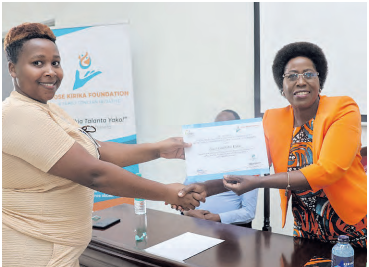
Students would not struggle with
unemployment after graduation if
they were compelled to study entrepreneurship in university, Kiambu
Deputy Governor Rosemary Kirika
has said.
Addressing JKUAT graduants in Gatundu North subcounty on Tuesday, she said universities should impart knowledge on how to establish smart innovations and grow businesses.
“Such studies would come in handy in encouraging young people not to depend on employment and instead become employers,” she said.
Some 100 youths and women graduated. They were sponsored by her Rose Kirika Foundation in partnership with the International Labour Organisation.
Kirika said making entrepreneurial studies compulsory would equip youths with the knowledge necessary to establish thriving businesses and reduce the rate of joblessness in the country.
Her foundation is working with ILO certified trainers as their curriculum addresses the needs of aspiring entrepreneurs at their level without any discrimination.
ILO promotes social justice and internationally recognised human and labour rights. The deputy governor said she started the foundation to empower individuals by helping them to discover their talents and turn them into sustainable businesses.
“This is especially relevant to the youths and women who may not have had access to formal business education,” she said.
“We are teaching them how to have business ideas and work on them so they can empower themselves and fend for themselves rather than waiting to be employed,” she said.
Lucy Gachiru, a graduate, lauded the foundation for the training, saying she had acquired crucial knowledge on how to turn waste materials into a profitable business.
Gachiru said she plans to use the knowledge to start a small business through which she will support her young family.
She called for more well-wishers to come out and initiate similar programmes to save Kenyans from the yoke of dependency.
Many people with bright ideas may be condemned to a lifetime of casual jobs and meagre salaries simply because they cannot access such trainings that transform their way of thinking.
Nancy Njeri, another graduate, called on other stakeholders to support the programme to enable it to reach out to more youths.
“The high level of unemployment
in the country means there is a high
number of people doing menial jobs
and struggling to put food on their
tables,” she said.

















